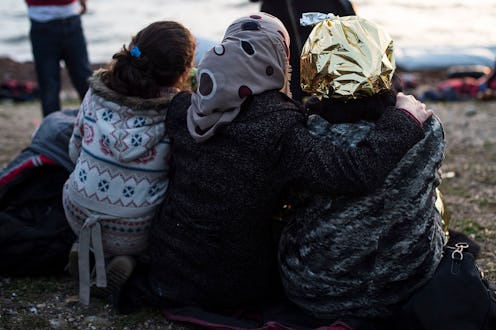
Though it pops in and out of the news cycle each week, it's more important than ever to remember not to forget about the war in Syria. On Monday, the Trump administration announced that it suspects Syria's president, Bashar al-Assad, may be planning another chemical weapons attack against Syrian citizens. Moreover, on the same day, the Supreme Court announced a partial implementation of Trump's travel ban, which could potentially prevent Syrian refugees from entering the United States.
As these developments illustrate, the war in Syria is still very much ongoing and paying attention to the plight of those affected by it is a humanitarian duty.
As many know, the Syrian civil war constitutes a conflict between President Bashar al-Assad's government and several oppositional forces. The war has been ongoing for over six years, since early 2011. Among other things, it's resulted in extensive loss of life and massive displacement. The United Nations estimated that, in 2015, over 250,000 people had been killed, though, according to BBC News, it stopped recording figures in August of that year. More recent reports for 2016 from a Syria-focused NGO estimate that over 470,000 people have died as a result of the Syrian conflict. Furthermore, according to estimates from the UN Refugee agency, as of last year, over 6.5 million have been internally displaced within the country.
Very sadly, Syrians are still incredibly vulnerable, and it is important to continue to recognize the extreme amount of hardship they've endured. Indeed, the United States' recent accusation that it suspects the Assad regime is planning another chemical weapons attack serves as an important reminder of the brutality of the Syrian war.
In April, a chemical attack with a suspected nerve agent occurred in a rebel-held town and killed more than 80 people. Ultimately, the Trump administration responded by firing missiles at a Syrian government air base.
Another chemical attack in Syria would be atrocious and deadly, and Trump's accusations that Assad is planning to execute such an attack illustrates that the war is absolutely not over and that the threat of brutality continues to loom.
Furthermore, the Supreme Court's recent decision to allow parts of Trump's travel ban to take effect, including subjectivity around refugee admissions, also highlights the notion that many refugees are still fleeing violence in Syria (and elsewhere). These refugees could now potentially face increased scrutiny when trying to enter the United States as a result of the partially-implemented ban.
Simply put, those in Syria and those fleeing Syria are still facing extensive hardship and need help, both through others raising awareness of their continued plight and through more concrete actions, like donations and volunteering.
If you are interested in helping those affected by the Syrian civil war, there are many resources from earlier this year that are still applicable. These resources delineate a variety of ways in which you can donate your time and resources to helping the people of Syria.